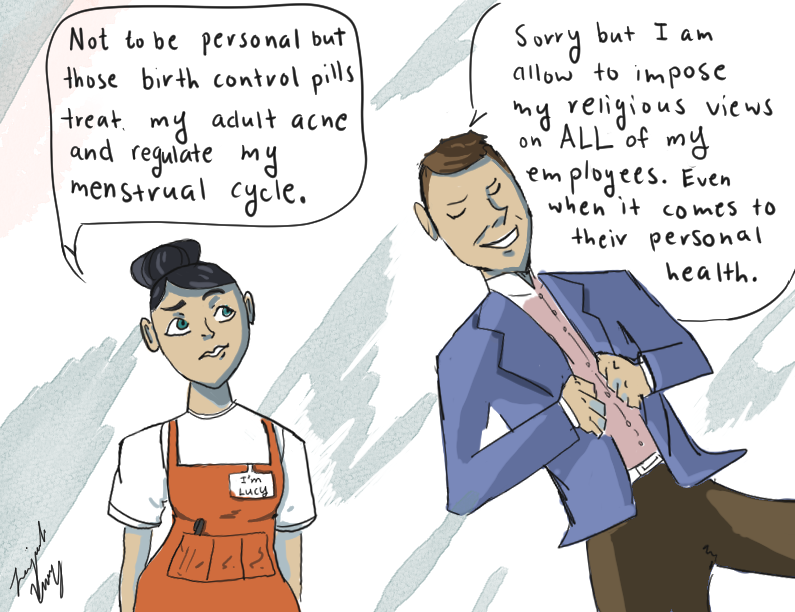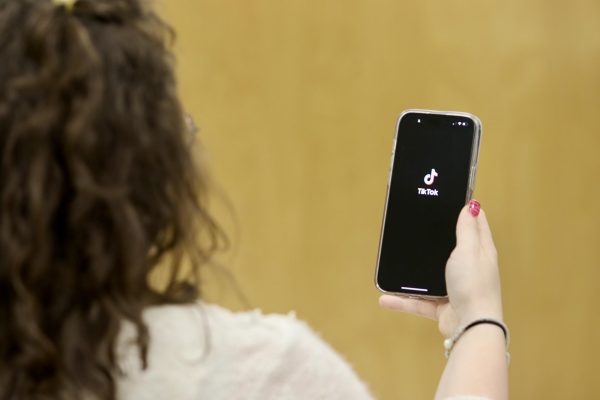Is The Handmaid’s Tale becoming a reality?
Is The Handmaid’s Tale becoming a reality?
On July 8, many women in the United States found themselves asking this recurring question as the Supreme Court upheld that many women around the country will be losing their access to birth control coverage.
The U.S. Supreme Court ruled in favor of Trump’s administration with a 7-to-2 decision that religious employers will no longer be required to provide insured birth control for their employees. This decision allows many corporations and CEOs to opt-out of the Affordable Care Act, which mandated that women receive free contraceptive services.
This decision will ultimately be harmful to the rights of a substantial amount of women.
According to the Centers for Disease Control, from 2015-2017, 64.9% of the 72.2 million women aged 15 through 49 in the United States were using contraception.
Birth control has proven to be beneficial in many ways. The most common use of birth control is to prevent unwanted pregnancies. Unintended pregnancy increases the risk of babies being born prematurely and with health deformities.
Along with preventing unwanted outcomes from having sex, oral contraceptives can reduce the risk of cancers such as endometrial and ovarian cancer, says the American Cancer Society. Many women, like myself and my peers, have also used birth control for acne treatment as well as treating other menstrual issues such as cramping and cycle regulation.
Those who oppose birth control have argued that contraception like condoms can be used, however, they fail to take into consideration that most condom users are men. Without the right to birth control, the fate of a woman’s future rests solely on the decision of a man.
Yet, men are not the ones who bear children.
Planned Parenthood states on their website that condoms are 98% effective at preventing pregnancy, but people aren’t perfect, so in real life, condoms are about 85% effective. Many women find themselves with abusive partners who can refuse to use them or in some instances, experience an unwanted pregnancy due to rape.
Clarence Thomas, Associate Justice of the Supreme Court, had an active stance in the majority rule, claiming that employers can object to birth control coverage for “moral reasons,” which expands from anything under the sun of beliefs.
The most popular employer has been Steve Green, President of Hobby Lobby craft store, who expressed that providing birth control coverage to his employees goes against his religious freedom.
In a MSNBC interview, Green stated, “If an authority asks us to violate what God has told us to do, we have to understand that we’re first responsible to God.”
It is not just big corporations like Hobby Lobby that have denied their workers access, but religious universities have also been included in the exemption with their faculty and staff, as well as employees of churches.
The Roman Catholic Church is among those against artificial contraception and all sexual acts outside of marriage. Little Sisters of the Poor Saints Peter and Paul Home, a Catholic Order of nuns that runs nursing homes, are the face of the case and have been fighting the mandate since 2013.
It has been an ongoing fight between the separation of church and state for as long as we can remember.
It is important for everyone to be able to exercise their right to freedom of religion, being a Christian myself, but what about the freedom of rights to those who do not carry those same values?
Ruth Bader Ginsburg, Associate Justice of the Supreme Court, said, “This Court has taken a balanced approach, one that does not allow the religious beliefs of some to overwhelm the rights and interests of others who do not share those beliefs. Today, for the first time, the Court casts totally aside countervailing rights and interests in its zeal to secure religious rights to the nth degree.”
In a country that preaches diversity, are those people’s rights not valued because they choose to believe differently?
To sum it up perfectly, Slate Write Dahlia LithWick says,“With these religious objector cases, we are witnessing the blurring of women’s constitutional and statutory rights into the background as the interests of everyone else, including their religious bosses, are positioned as singular and urgent.”
Regardless of religion, a woman’s access to birth control should be between her and her doctor or health care provider.
I can’t help but relate this ruling to the popular TV show, “The Handmaid’s Tale,” based on the novel by Margaret Atwood. The show depicts a society where women are stripped from their basic constitutional rights, and religion determines how the government is run, as well as what women can and cannot do with their own bodies.
Just like in many other religions and different parts of the world, where women are not allowed to read or write, purchase or own things for themselves, denied healthcare options, and have no say in government affairs, women in our country are being kept from facilities that help preserve their rights.
Although the United States does not share this exact extent of infringement on human rights, it makes me wonder: What will be next for women?
Is taking away birth control coverage just the start?
Editor’s note: Edited for clarity 08/08/2020
Your donation will support The Lion's Roar student journalists at Southeastern Louisiana University.
In addition, your contribution will allow us to cover our annual website hosting costs.
No gift is too small.

Gabby Wood is a communication major with a focus in public relations. Outside the office, you can find her trying new coffee shops and endlessly scrolling...








Taylor • Aug 8, 2020 at 6:46 pm
The comment regarding unintended pregnancies being linked to having a premature birth/a potential health deformity is extremely upsetting. I was born prematurely, and my life has as much value as someone that was born full term. Neither of those things are bad, and that is not a strong argument for free birth control. As someone who was almost forced to take the pill but dared to do my research, I can assure you that the pill does more harm than good. It actually killed three women in Puerto Rico when it first came out. My issues have been treated by using Naprotechnology and the Creighton method, it’s very empowering to be in tune with my body rather than using a pill that will merely cover up my symptoms. According to the National Cancer Institute, the pill can increase a woman’s risk for breast and cervical cancers. If you wish to track your cycle and get to the root cause of issues, check out the FEMM app. 🙂
Herbie • Aug 6, 2020 at 11:16 pm
You might want to check any number of Muslim nations to catch a glimpse of true oppression of women for religious reasons